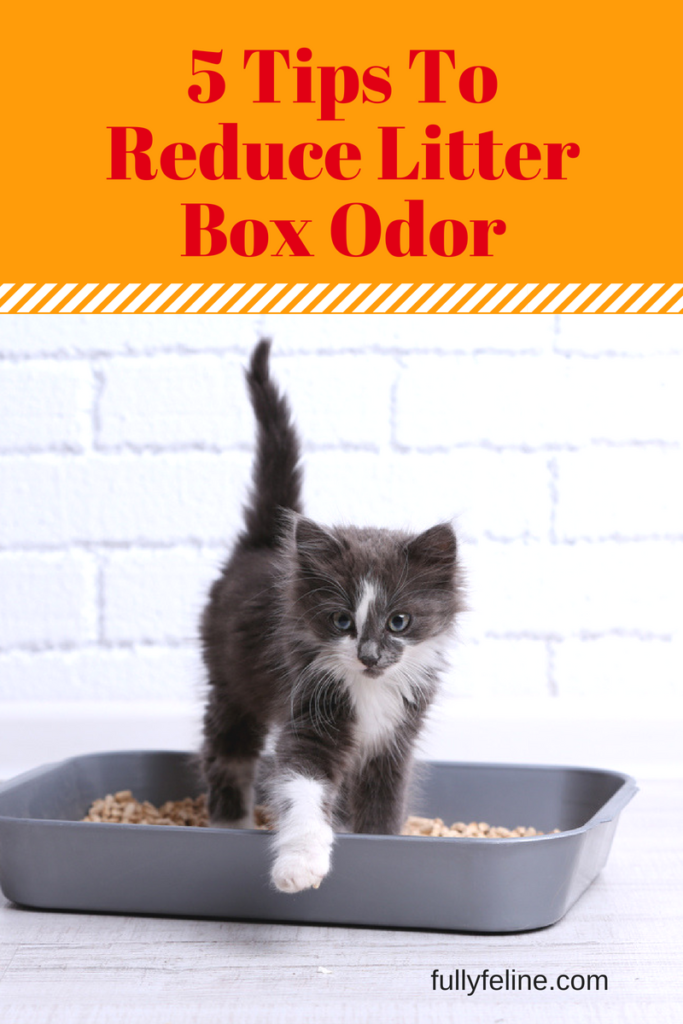Ahhh…the litter box. What a wonderful idea. Unlike owning a dog, with a cat you don’t have to go outside in all elements to have him “take care of business.” Your cat instinctively knows what the litter box is for. However, your cat is not necessarily equipped to clean up the mess!
Disclosure: This post contains affiliate links. We receive a small commission on goods purchased via these links, at no additional cost to you.
As we all know, left unattended for a period of time, that litter box can become a land mine and deliver one incredible assault on the senses! Fortunately, there are a few ways you can reduce that litter box smell – and the messes – if you implement a few of these simple tips and suggestions!
Daily Scooping
If possible, try to clean the litter boxes twice a day, but at least once. This will make you happy and your nose, as well.
Clumping litters are usually the easiest to scoop and keep clean. Low-dust litter is a good option, especially if you (or your cat!) have asthma. Make sure you have a sturdy scoop, some I’ve encountered are quite flimsy. I recommend the metal scoops. They are well made, do a good job of sifting and scraping bottom of the litter box when needed.
Plus, if there is too much “poo” in the box, your cat is more likely to take care of business outside of the box, and who has time to clean all that up?
Do you have a busy schedule that makes it tough to do litter box maintenance daily? Consider a mechanized litter box such as the LitterMaid Self-Cleaning Litter Box. They work pretty well and take some of the burden off when talking litter box daily maintenance.
Thoroughly Clean Litter Boxes Monthly
This will be far easier to do if you commit to scooping at least once a day. Empty the litter from the boxes and scrub them thoroughly using soap and water. Bleach or other chemicals may cause your cat to avoid using the box all together. Then, dry the boxes and add fresh litter.
Replace Boxes Periodically
Over time, litter boxes become scratched from the frequent clawing of your cat trying to bury his waste. These scratches can harbor bacteria and build up, leading to a smelly residue. Replace the boxes yearly.
Check For Proper Ventilation
Often, cat’s litter boxes are located in small, confined spaces. This is understandable, but it also allows odors to collect and concentrate in a single spot. Gross!!!!!
Your cat may begin to avoid this small area due to the smell, especially if the litter box has a cover. Then what? Put the litter boxes in areas that are well-ventilated.
Baking Soda….The Magical Powder!
Sprinkle baking soda on the bottom of the box before you add fresh litter each week.This will help absorb odors but will not add irritants that will upset your cat’s nose and lungs.
Never add perfumes or sprays near the box. Sure, those might temporarily mask the smell, but they can be highly irritating to your cat’s nose and lungs. Further, such smells could actually discourage your cat from using the litter boxes.
Conclusion
Finally, if your cat does make a mess outside of the box, be sure to clean it up quickly and thoroughly. This will eliminate the smell and prevent odors from developing over time.
If you do all of the above, but notice your cat consistently eliminating outside his litter box, this could be a sign of illness. Schedule a vet appointment to rule out medical issues.
Source: preventivevet.com with Dr. Jason Nicholas







